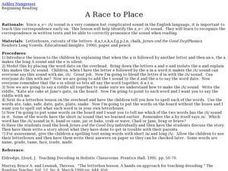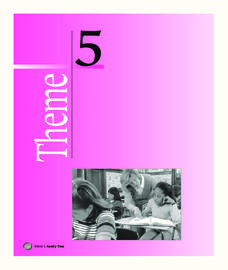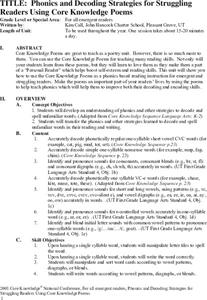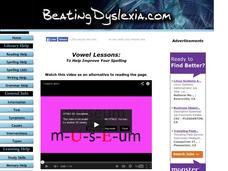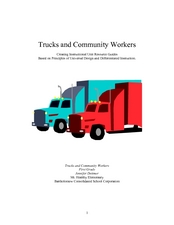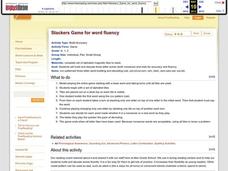Curated OER
A Race to Place
Students distinguish between short vowel a and long vowel a. They are introduced to the vowel-consonant-e pattern that changes short vowel sounds into long vowel sounds. They practice spelling words with the vowel-consonant-e pattern.
Houghton Mifflin Harcourt
Person to Person: Extra Support Lessons (Theme 4)
Authors use many strategies when writing stories. A series of extra support lessons breaks down those strategies, as well as key grammatical and phonics-based concepts to support struggling learners. The last of three lessons offers...
Michigan Department of Education
Family Fundamentals for Summer Learning
Just because it's summertime, doesn't mean that learning has to stop. Support children with continuing to develop their reading fluency with this extensive collection of literacy activities.
Houghton Mifflin Harcourt
Family Time: English Language Development Lessons (Theme 5)
Support English language development with a family-themed unit consisting of a series of lessons designed to get your scholars moving, looking, speaking, writing, and listening. Conversation topics...
Curated OER
Stackers Game for word fluency
Students create three letter words and decode for fluency and accuracy. In this fluency lesson, students use alphabet tiles to build words with the CVC pattern and read the word aloud. Students alternate turns by stacking one...
Curated OER
Ending Consonant + le (Syllabication)
In this syllabication instructional activity, learners read six words that have the "le" ending. Students divide each word into syllables using a slash mark.
Curated OER
Vowel-Consonant-Vowel Words
In this VCV words instructional activity, students write words and make slashes between syllables, using the VCV rule. One example is completed for students
Curated OER
Making Words
Third graders spell words and define homophone. In this making words lesson, 3rd graders decipher words from letter strips in an effort to identify the "secret word". Students use a set of letters to spell different words.
Curated OER
Made You Mad
High schoolers explore the phoneme for the vowel-consonant-silent e grapheme. They recognize the silent "e" at the end of words and practice speaking them. Students say words, spell them, and say tongue twisters with the vowel...
Curated OER
Phonics lesson for "sh"
First graders identify words with the "sh" pattern. They participate in phonemic awareness, decoding, blending, spelling patterns, and dictation exercises. As the assessment portion of the lesson, they may write a story using words...
Curated OER
Phonics and Decoding Strategies for Struggling Readers Using Core Knowledge Poem
Students complete multiple activities to help them hear sounds, syllables, and spell words with vowel patterns, digraphs, or blends. In this word sounds lesson, students use letter tiles, sort words cards, analyze poems, and play a bingo...
Curated OER
Phonics worksheet
In this literacy worksheet, students use the blends along with the pictures in order to practice the sounds of letter combinations.
Curated OER
Phonics lesson for -ar
First graders identify words associated with the -ar sound. They read sentences and compose a story that include words with the -ar sound. The assessment portion of lesson involves students in spelling words with the
-ar pattern.
Curated OER
CVC Pattern with "o" as a Short Vowel- Picture/Word Identification
In this CVC short "o" spelling pattern worksheet, 1st graders say the name of each black line picture. They write the names using the 10 words that are listed in the word bank at the bottom of the page.
Curated OER
Words That End in "--tch"
In this language arts worksheet, students investigate words that end with "--tch." Students read a 2 page story about an angry wife who ends up at her own surprise birthday party. Students mark the "--tch" words. Then students complete a...
Curated OER
Vowel Lessons: To Help Improve Spelling
There are a few things every good speller knows: spelling rules, vowel sounds, and word endings. Help your learner with dyslexia become a more efficient speller with a few tips from a dyslexia expert. Included in the lesson is a video,...
Curated OER
Sound It Out!
Help your class improve their spelling skills. Learners take a test, are given a particular spelling rule to practice, and play a Bingo game. This employs various methods for practicing spelling skills.
Curated OER
What Do You See at the Pond?
With What Do You See at the Pond?, young readers explore pond life and practice reading strategies. Learners first make predictions and then read the simple story independently. After a second read-through with a partner, kids come...
Curated OER
Poetry Notes
Break this presentation into two or three days so as not to overwhelm your kids. Fifty-four slides is a lot of slides, but the PowerShow is well-organized, and terms are defined clearly and illustrated in examples provided. A general...
Curated OER
The Indefinite Article "a" or "an"--Cut and Paste
In this language arts worksheet, students learn when to use each article "a" or "an" by first reading the rules, then cutting out small boxes with the articles. Students paste the correct article in front of 12 words, then write 12 of...
Curated OER
Trucks and Community Workers
First graders identify community helpers and their roles. In this transportation lesson plan, 1st graders complete a series of lessons integrating technology and literacy. Students decode sounds of short u, c/s/ and g/j/ words and...
Curated OER
Stackers Game for Word Fluency
Explore words by building and decoding three-letter words. Real or nonsense words can be formed with the alphabet tiles. Practice fluency and blending sounds with CVC patterns.
Alabama Learning Exchange
Phonics lesson for -ick family
Kindergarteners and first graders develop phonemic awareness for words that contain -ick. Each learner gets a stack of cards with different -ick words, highlighting the target sound as they review each one.
Alabama Learning Exchange
Animal Classification
Present information about the classification of animals. After participating in the teacher-led discussion about scientific names, small groups devise their own way of classifying everyday objects present in the classroom, developing...
